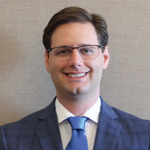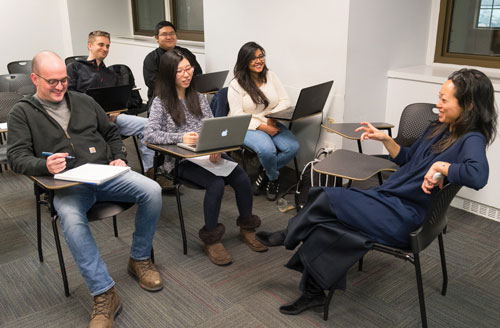2020 Leaders in Graduate Education
THIS GUIDE IS NO LONGER ACTIVE. For the current FP Guide, click here.
Pano Yannakogeorgos, Clinical Associate Professor and Faculty Lead, MS in Global Security, Conflict, and Cybercrime
NYU School of Professional Studies, Center for Global Affairs
When the US Air Force saw the need to teach its nontechnical employees about the threats and strategies of the cyber world, it tapped Pano Yannakogeorgos to found the new Air Force Cyber College. Yannakogeorgos, then a research professor of cyber policy at the Air Force Research Institute, had led a study for the Air Force’s chief of staff on cyber workforce development. One of the study’s impacts was mandating the creation of the new Air Force Cyber College at Air University. Yannakogeorgos became its founding dean.

“There is a lack of individuals who have a conceptual idea of the field of cybersecurity and who can communicate with leaders to develop technically informed policies and strategies.” –Pano Yannakogeorgos, Clinical Associate Professor and Faculty Lead, MS in Global Security, Conflict, and Cybercrime, Center for Global Affairs, NYU School of Professional Studies
Although formally educated in philosophy and global affairs, Yannakogeorgos grew up interested in computers and networks. He managed small business and nonprofit networks and websites in his youth and earned an MA and a PhD at Rutgers University. He was working on his PhD in global affairs when terrorists and nations increasingly began using cyber tools to wreak havoc. The headlines “took my dissertation out of the realm of sci-fi” and heightened the connection between international affairs and cyberspace, he says.
During his graduate studies, Yannakogeorgos recognized that many of his social science–oriented peers were reluctant to delve into the field of cyber and how it was impacting society. “I think that’s a big part of the reason why there is a lack of individuals who have a conceptual idea of the field of cybersecurity and who can communicate with leaders to develop technically informed policies and strategies,” he says.
 While Yannakogeorgos was at the Air Force Cyber College, the New York University (NYU) School of Professional Studies’ Center for Global Affairs (CGA) recognized that leaders in business and government had a need for nontechnical individuals who understood cyber strategy and policy. Building on the success of the 15-year-old MS in Global Affairs, CGA created the new MS in Global Security, Conflict, and Cybercrime and recruited Yannakogeorgos. He jumped at the chance to scale up his educational entrepreneurship from the Air Force to a program that could have a worldwide impact.
While Yannakogeorgos was at the Air Force Cyber College, the New York University (NYU) School of Professional Studies’ Center for Global Affairs (CGA) recognized that leaders in business and government had a need for nontechnical individuals who understood cyber strategy and policy. Building on the success of the 15-year-old MS in Global Affairs, CGA created the new MS in Global Security, Conflict, and Cybercrime and recruited Yannakogeorgos. He jumped at the chance to scale up his educational entrepreneurship from the Air Force to a program that could have a worldwide impact.
“What’s different here at CGA is, we’re looking at cyber through a multidisciplinary social science lens. We don’t expect our students to have a technical background,” he says. The new cyber program, which began in the fall of 2019, develops a global student body to provide leadership, management, direction, advocacy, and analysis in support of strengthening the cyber posture of an organization to assure its mission in a contested operational environment.
With students from around the world, that cadre someday will help create the international norms and policies that will counter cyber threats. CGA students have a close relationship with the United Nations, which offers the opportunity for a consulting practicum with the Counter-Terrorism Committee Executive Directorate.
 At CGA, in addition to the new cyber program, the MS in Global Affairs offers students a plethora of interdisciplinary concentrations: Environment/Energy Policy; Global Economy; Global Gender Studies; Human Rights and International Law; International Development and Humanitarian Assistance; International Relations/Global Futures; Peacebuilding; and Transnational Security.
At CGA, in addition to the new cyber program, the MS in Global Affairs offers students a plethora of interdisciplinary concentrations: Environment/Energy Policy; Global Economy; Global Gender Studies; Human Rights and International Law; International Development and Humanitarian Assistance; International Relations/Global Futures; Peacebuilding; and Transnational Security.
CGA’s job-placement rate six months after graduation historically has been about 96 percent, with students landing in places such as the US State Department, the United Nations, and numerous private companies.
Graduate Degree Program Options
- MS in Global Affairs
- MS in Global Security, Conflict, and Cybercrime
Visit the Request Info page to receive more information.
Contents
- 2020 Leaders in Graduate Education
- Johns Hopkins School of Advanced International Studies
- UC San Diego, School of Global Policy and Strategy
- Indiana University, Hamilton Lugar School of Global and International Studies
- NYU School of Professional Studies, Center for Global Affairs
- Tufts University, The Fletcher School
- University of Kent, Brussels School of International Studies
- Columbia University, School of International and Public Affairs (SIPA)
- University of Texas at Austin, LBJ School of Public Affairs

